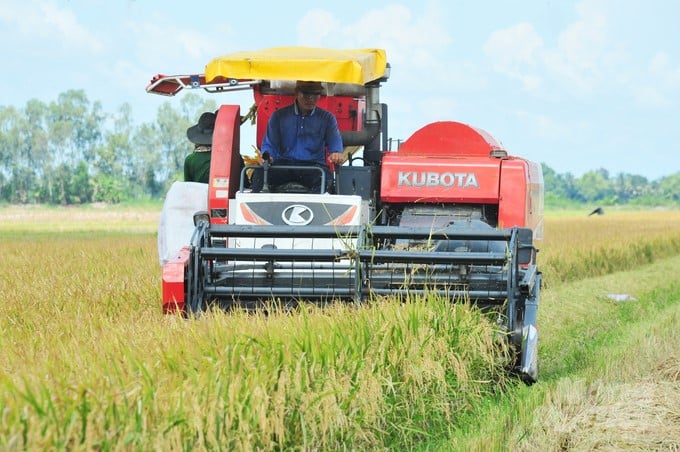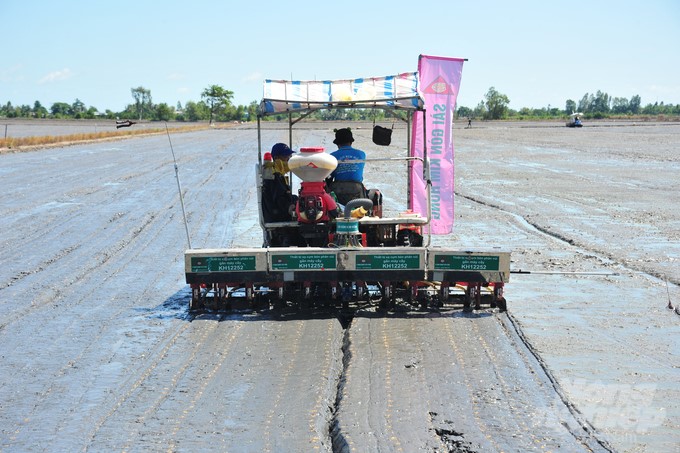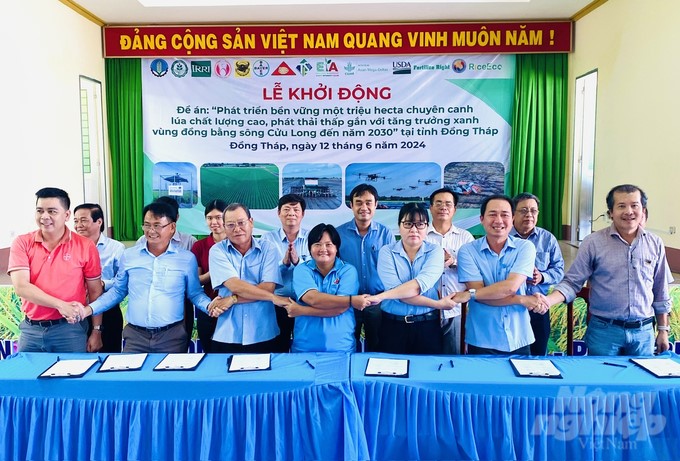June 17, 2025 | 03:00 GMT +7
June 17, 2025 | 03:00 GMT +7
Hotline: 0913.378.918
June 17, 2025 | 03:00 GMT +7
Hotline: 0913.378.918

Deputy Minister of Agriculture and Rural Development Tran Thanh Nam visits rice fields in the project "Developing 1 million hectares of high-quality, low-emission rice associated with green growth in the Mekong Delta until 2030" in Thap Muoi district, Dong Thap province. Photo: Le Hoang Vu.
The project "Developing 1 million hectares of high-quality, low-emission rice associated with green growth in the Mekong Delta until 2030" initiated by MARD not only aims to increase productivity but also create sustainability in farming and support farmers to improve their income.
Dong Thap is one of the pioneering provinces in implementing this project. The locality has identified suitable lands to grow high-quality rice and developed programs to support and encourage farmers to participate in this value chain. The Dong Thap Department of Agriculture and Rural Development accompanied cooperatives in the province to develop the rice linkage chain, from production and harvest to consumption.
According to Mr. Nguyen Van Vu Minh, Director of the Dong Thap Department of Agriculture and Rural Development, the locality's goal is to make Dong Thap rice a product with a strong brand in the market. Building a rice linkage chain not only helps improve quality but also creates conditions for farmers to sell products at better prices. Dong Thap will continue to invest in research, technical support, and brand development to enhance the value of rice products.

Farmers participating in the project's model are very excited because input costs reduce by 20–30% while profits increase by 2.2 million VND/ha compared to control fields. Photo: Le Hoang Vu.
During the implementation of the project, cooperatives in Dong Thap have become a bridge between farmers and consuming businesses. Among them, Thang Loi Agricultural Service Cooperative in Lang Bien commune (Thap Muoi district), one of the units pioneering in participating in this project, achieved good results in rice farming.
Mr. Nguyen Van Hung, Director of Thang Loi Agricultural Service Cooperative, said: In the recent summer-autumn rice crop of 2024, 20 farmer households in the cooperative participated in implementing the project model on an area of more than 43 hectares of rice. Farmers applied technical processes for high-quality and low-emission rice production in the Mekong Delta issued by the Department of Crop Production (Ministry of Agriculture and Rural Development). Specifically, farmers have applied mechanization in sowing (row sowing, cluster sowing combined with fertilizer burying); reduced the amount of seed by 80 kg/ha compared to machine spraying (using only 70 kg of seed/ha); reduced the amount of fertilizer by 20-40%; reduced the number of pesticide spraying times; collected straw from the field; and signed rice consumption contracts with businesses.
From there, farmers reduce production costs, increase rice grain quality, increase profits, reduce environmental pollution, and reduce greenhouse gas emissions (reduced by 4.92 tons CO2e/ha). Rice productivity reaches 6.5–6.9 tons/ha, and the business is responsible for purchasing all products at a price 100–150 VND/kg higher than the market price. The model's profit is 2.2 million VND/ha higher than the control. Especially, rice growers' income increases by 800,000–900,000 VND/ha compared to the control thanks to selling straw after harvest.

Equipment for cluster sowing and fertilizer burying from Saigon Kim Hong Company is applied in the fields in hamlet 4, Lang Bien commune, Thap Muoi district. Photo: Le Hoang Vu.
Besides the results achieved, many farmers in the model commented that there are still some difficulties, such as uneven fertilizer burying; infeasible water draining from rice fields in the period of 12–21 days after sowing; difficult straw collection during the rainy season; and collecting and storing straw in large quantities at the same time that needs to be done with many solutions. Along with that, ensuring the number of machines to apply mechanization (from sowing to harvesting) on a large area and in a simultaneous way when replicating the model needs to be calculated properly.
Mr. Nguyen Phuoc Thien, Vice Chairman of the Dong Thap Provincial People's Committee, said: The model's first goal is to reduce production costs for farmers. Therefore, it is recommended that farmers and cooperatives in the province comply with the production process, ensuring the model's criteria.
In order for the project to promote efficiency in the coming time, the Dong Thap Provincial People's Committee hopes that businesses and sponsors will continue to support and accompany the province in implementing the model. It is recommended that the local agricultural sector research and invest in modern machinery and equipment to provide machinery rental services to farmers and cooperatives.
Dong Thap will continue to expand production scale, improve technical processes, and raise quality standards. At the same time, organic and sustainable farming models will be prioritized for development to meet the world market's increasingly high requirements for food safety and environmental protection.

Currently, Dong Thap's agricultural sector is accompanying cooperatives and businesses participating in the 1 million hectares of high-quality rice project to promote the development of the rice linkage chain, from production and harvesting to consumption. Photo: Le Hoang Vu.
"The project to develop 1 million hectares of high-quality rice is not only a breakthrough in the agricultural sector but also brings many opportunities for farmers in Dong Thap. The province is gradually becoming one of the high-quality rice production centers in the Mekong Delta, thereby contributing to enhancing the brand and value of Vietnamese rice in the international market," expected Mr. Nguyen Phuoc Thien, Vice Chairman of the Dong Thap Provincial People's Committee.
According to the plan, by 2025, Dong Thap province will implement the project in seven rice-growing districts and cities in the province, including Tan Hong, Hong Ngu, Tam Nong, Thanh Binh, Cao Lanh, Thap Muoi, and Hong Ngu city, with a total area of nearly 70,000 hectares. By 2030, in addition to the seven localities mentioned above, the project will be implemented in Lap Vo district, with a total area of 161,252 hectares.
Translated by Thu Huyen
![Turning wind and rain into action: [4] Bringing climate bulletins to remote and isolated areas](https://t.ex-cdn.com/nongnghiepmoitruong.vn/608w/files/linhnhp/2025/06/14/1152-z6704423696987_15fd32ffc26d590d204d520c9dac6786-nongnghiep-151141.jpg)
(VAN) The Vietnam Agriculture and Nature Newspaper interviewed Mr. Vu Thai Truong, Acting Head of Climate Change and Environment at UNDP Vietnam, to gain deeper insight into how climate bulletins are delivered to farmers.

(VAN) In Tien Giang, a high-tech shrimp farm has developed a distinctive energy-saving farming model that has yielded promising results.
![Turning wind and rain into action: [3] 300.000 farmers benefit from agro-climatic bulletins](https://t.ex-cdn.com/nongnghiepmoitruong.vn/608w/files/news/2025/06/12/e5a48259d6a262fc3bb3-nongnghiep-125122.jpg)
(VAN) The agro-climatic bulletin has become a valuable tool for farmers in the Mekong Delta. After more than five years of implementation, the initiative is gradually being expanded nationwide.
![Turning wind and rain into action: [2] Providing forecasts to the people](https://t.ex-cdn.com/nongnghiepmoitruong.vn/608w/files/news/2025/06/12/e5a48259d6a262fc3bb3-nongnghiep-103927.jpg)
(VAN) In addition to improving the quality of hydrometeorological forecasts, putting forecast bulletins into practical use is crucial for production and disaster prevention.

(VAN) Blue carbon is receiving attention for its rapid absorption capacity and vast potential. It represents a promising nature-based solution to respond to climate change.
/2025/06/11/3507-1-161904_583.jpg)
(VAN) Seagrass beds and coral reefs serve as 'cradles' that nurture life in the ocean depths, creating rich aquatic resources in Vietnamese waters.
![Turning wind and rain into action: [1] Forecasting for farmers](https://t.ex-cdn.com/nongnghiepmoitruong.vn/608w/files/news/2025/06/11/e5a48259d6a262fc3bb3-nongnghiep-111919.jpg)
(VAN) Weather is no longer just a matter of fate. Forecasts have now become an essential companion for farmers in every crop season.